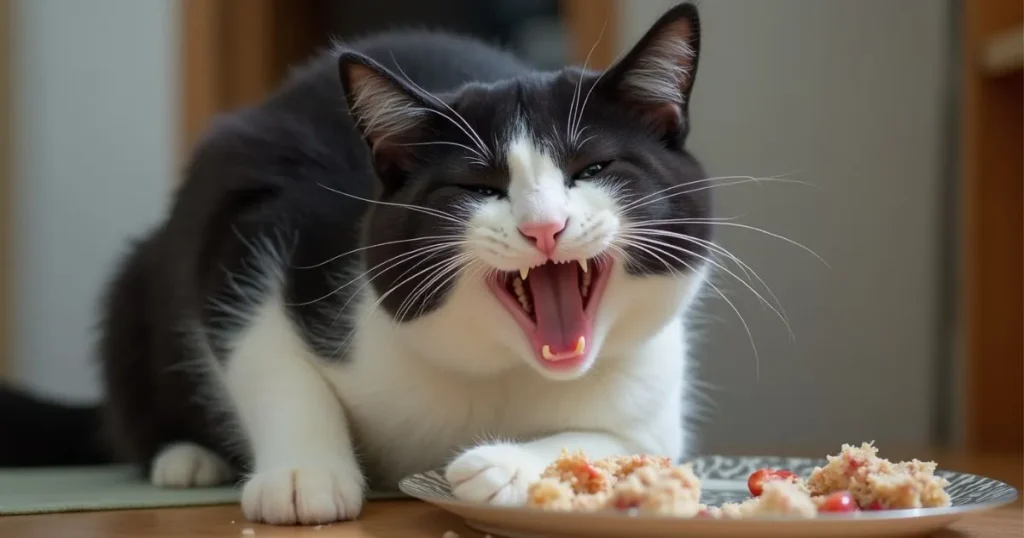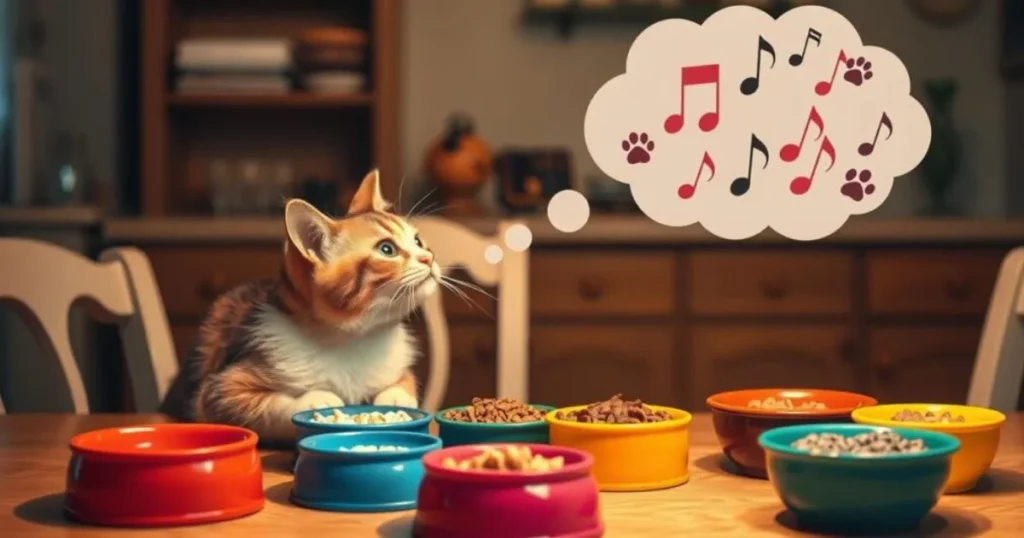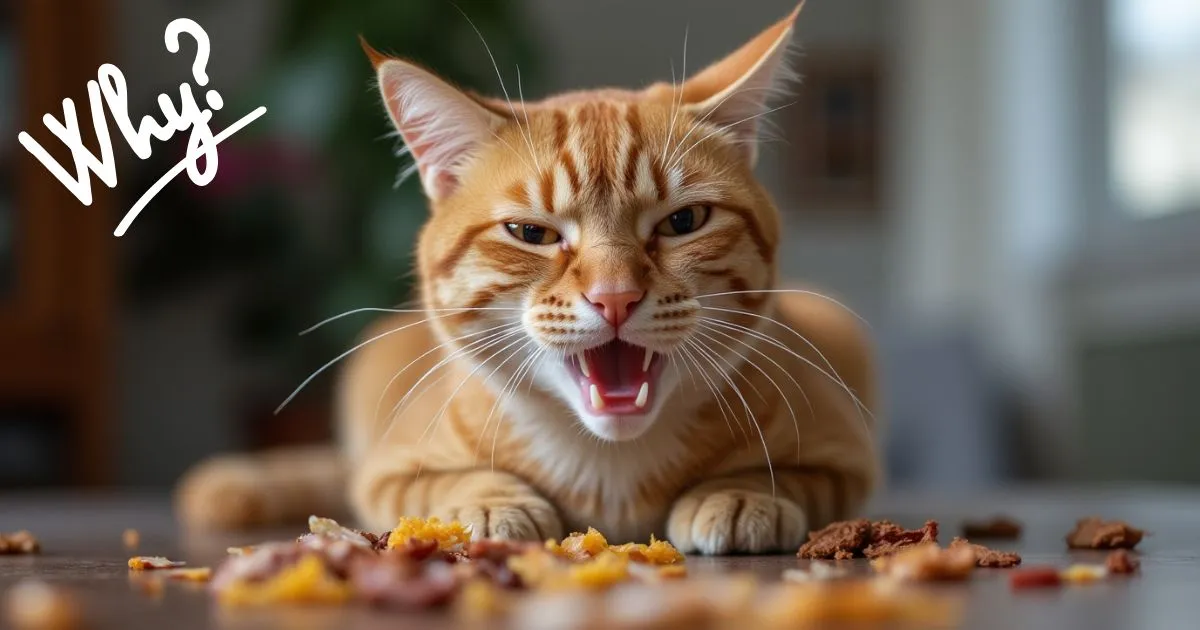If you’re a cat owner, you might have seen your cat meow after eating. This behavior might seem strange, but it’s quite common. This guide will help you understand why your cat meows after meals. It’s all about their way of talking to you and what it might mean.
Table of Contents
Key Takeaways
- Understand the distinction between normal and abnormal post-meal cat meowing
- Explore the various types of post-meal vocalizations and when to be concerned
- Uncover the natural behaviors that shape your cat’s communication around mealtime
- Identify common reasons for cats meowing after eating, including satisfaction, attention-seeking, and digestive discomfort
- Learn about medical conditions that may cause increased post-meal meowing
Understanding Normal vs. Abnormal Post-Meal Cat Meowing
As a cat owner, you might hear your cat meowing after eating. But how do you know if it’s normal or if you should worry? Let’s explore the different types of meows after eating when to worry, and what patterns to watch for.
Common Types of Post-Meal Vocalizations
Cats can make various sounds after eating, including:
- Satisfied meows – A short, happy-sounding meow that means they enjoyed their meal.
- Demanding meows – Louder, more urgent meows mean they want more food or attention.
- Distress meows – Higher-pitched, worried-sounding meows that might mean they’re uncomfortable or sick.
When to Be Concerned About Your Cat’s Meowing
Some meows after eating are normal, but changes in behavior are important to notice. If your cat meows a lot, loudly, or for a long time after eating, it could be a sign of a problem. This might include digestive issues or dental pain. If your cat also loses appetite, vomits, or loses weight, it’s time to see the vet.
Duration and Frequency Patterns
Healthy cats usually meow for less than a minute after eating. If they meow for a long time or often, it might mean there’s an issue that needs checking.

The Natural Instincts Behind Your Cat’s Mealtime Communication
Have you ever wondered why your cat meows or chirps at mealtime? These sounds are not just random. They are part of the cat theory communication and their ancient instincts.
Even though cats are domesticated, they still act like their wild ancestors. Mealtime is key for them to show their needs and feelings. and It’s linked to their survival instincts.
Evolutionary Roots of Cat Mealtime Vocalizations
In the wild, cats must hunt and eat to live. They hunt, capture, finish, and enjoy their prey. Each step has its sounds to communicate with pride.
When a cat meows after eating, it’s a behavior from their past. This meow might mean they’re happy, want more food, or need attention.
The Impact of Domestication on Mealtime Communication
Domestic cats don’t hunt anymore, but they still act like their wild relatives at mealtime. Domestication has also made them use more sounds to talk to humans.
Knowing about your cat’s natural instincts at mealtime helps you understand them better. It makes sure you both enjoy mealtime together.

Common Reasons Why Cats Meow After Eating
If your cat meows after eating, it’s important to know why. Cats meow for many reasons, and after eating, it often means they need something. This could be a sign of their happiness or a need for more food.
Satisfaction and Contentment
One reason cats meow after eating is because they’re happy. It’s like they’re saying, “That was delicious!” This type of meow is typically gentle, indicating contentment.
Seeking Attention or Additional Food
Another reason is that they might want more food or attention. If your cat meows a lot, they might be hungry or want to play. It’s important to check if they’re getting enough to eat.
Digestive Discomfort Signals
Meowing after eating can also mean your cat is not feeling well. If they’re also vomiting or feeling tired, you should take them to the vet. This may suggest an underlying concern.
Knowing why your cat meows after eating helps you take better care of them. By listening to their meows, you can make sure they’re happy and healthy.
| Reason | Description |
|---|---|
| Satisfaction and Contentment | Cats may meow to express their enjoyment of a tasty meal, similar to how humans might vocalize their appreciation for a delicious dish. |
| Seeking Attention or Additional Food | Meowing after eating can be a request for more food or a plea for your attention, especially if the cat is still hungry or wants more treats or playtime. |
| Digestive Discomfort Signals | Post-meal meowing can also be a sign of digestive discomfort or potential medical issues, so it’s important to consult a veterinarian if the behavior is accompanied by other symptoms. |
Medical Conditions That Cause Cat Meows After Eating
Cats often meow after eating, but too much meowing can mean a health issue. Several health problems might make your cat meow more after meals. Knowing these can help you find the cause and get your cat the care they need.
Food issues causing cat meows and cat coughing can point to digestive problems. Issues like inflammatory bowel disease, pancreatitis, or food allergies can cause discomfort. Dental issues, like tooth or gum infections, can also make eating painful and lead to more meowing.
Neurological problems, like seizures or brain tumors, can also cause your cat to meow more after eating. These issues can affect how your cat’s nervous system works, leading to more vocalizations.
- Digestive disorders (e.g., inflammatory bowel disease, pancreatitis, food allergies)
- Dental problems (e.g., tooth or gum infections)
- Neurological issues (e.g., seizure disorders, brain tumors)
If your cat meows a lot after eating and it worries you, see a vet. They can check your cat, run tests, and find the right treatment. This will help your cat feel better and stop the meowing.
| Medical Condition | Symptoms | Treatment |
|---|---|---|
| Inflammatory Bowel Disease | Chronic diarrhea, vomiting, weight loss, abdominal pain | Dietary changes, medication, and in severe cases, surgery |
| Pancreatitis | Abdominal pain, decreased appetite, vomiting | Fluid therapy, pain medication, and dietary management |
| Dental Problems | Difficulty chewing, bad breath, red or swollen gums | Dental cleaning, tooth extraction, and antibiotics |
Resolving the health concern can ease your cat’s discomfort and reduce the meowing. Regular vet visits and care are key to keeping your cat healthy and happy.
The Connection Between Food Quality and Post-Meal Behavior
Understanding why your cat meows after eating involves looking at their diet. The quality and type of food they eat can greatly affect their behavior after meals. It’s key to consider this connection.
Impact of Different Food Types
The food your cat eats can deeply impact their behavior after meals. For example, cats on a diet high in certain ingredients might meow or cry more. This could mean they’re not feeling well or are unhappy with their food.
However, a good, balanced diet can make your cat feel better and more content after eating. This leads to a more peaceful time after meals.
Dietary Sensitivities and Allergies
Food sensitivities or allergies can also cause your cat to meow or yowl after eating. Ingredients like certain proteins or additives can upset their stomach. This discomfort can lead to them making noise to express their pain.
If your cat meows or acts strangely after eating, it’s time to see the vet. They can help figure out if there’s a problem with their diet. This is important for your cat’s health and happiness.
Knowing how food affects your cat’s behavior after meals helps you make better choices. A balanced diet and being aware of food sensitivities can make mealtime better for both you and your cat.
How Age Affects Your Cat’s Post-Meal Vocalizations
As your cat gets older, their meowing after eating might change. The cat meowing after eating or why does cat meows after eating can depend on their age. Knowing these changes can help you understand your cat better and meet their needs.
Kittens often meow a lot after eating as they learn about food and hunger. This behavior usually goes down as they grow up. However, older cats might start meowing more after eating because of health issues like dental problems or cognitive decline.
- Kittens – Frequent post-meal meowing as they establish feeding patterns
- Adults – Reduced meowing as they mature
- Seniors – Increased meowing due to age-related health concerns
Watch how often and how long your cat meows after eating. If it changes suddenly or lasts a long time, it could mean they’re sick. Knowing how your cat’s age affects their behavior helps you care for them better at every stage of their life.
Environmental Factors Influencing Post-Meal Behavior
Understanding why your cat meows after eating involves looking at their mealtime environment. The feeding schedule, location, and setting all play a big role. These factors can affect your cat’s behavior and vocalizations after eating.
Feeding Schedule Impact
Cats like routine, and their meals are no different. Irregular feeding times can make them meow more. Regular feeding times give your cat a sense of security, minimizing meowing after meals.
Location and Setting Considerations
The place where your cat eats also matters. They might meow more in new or busy places because they feel stressed. A quiet, dedicated eating area can make mealtime more relaxed and reduce meowing.
Knowing how the environment affects your cat’s behavior after eating helps. You can create a better mealtime routine and space. This leads to a more peaceful and enjoyable time for your cat.
| Environmental Factor | Impact on Post-Meal Behavior |
|---|---|
| Feeding Schedule | Consistent, predictable mealtimes can reduce post-meal meowing, while erratic schedules may increase vocalizations as cats seek to communicate their hunger or dissatisfaction. |
| Location and Setting | Cats are more likely to meow after eating in unfamiliar or crowded environments, as they may feel stressed or unsettled. Providing a quiet, dedicated feeding area can promote a more relaxed mealtime experience. |
When to Consult Your Veterinarian About Mealtime Meowing
If your cat meows a lot after eating, it might be a sign of a bigger issue. While some meowing is normal, other signs could mean your cat needs a vet. These signs could point to a health problem that needs attention.
Here are some signs you should see a vet:
- Persistent or prolonged meowing after meals that disrupts your cat’s normal routine
- Changes in the tone, pitch, or volume of your cat’s meows that seem distressed or painful
- Accompanying symptoms like cat coughing, vomiting, loss of appetite, or unusual restlessness
- Sudden onset of why does my cat yowl after eating behavior that wasn’t present before
Your vet can do a full check-up and might run tests to find out why your cat is meowing. They might look for things like stomach problems, food allergies, or even brain issues.
Seeing your vet early can help your cat feel better and enjoy meals again. If you’re worried about your cat’s meowing or eating habits, call your vet.
Behavioral Training Tips to Address Excessive Meowing
If your cat meows a lot after eating, there are ways to stop it. Understanding why they meow and using positive methods can help. This way, you can keep your home peaceful.
Establish a Consistent Feeding Routine
Cats like knowing what to expect. So, feed them at the same times every day. Don’t let them eat whenever they want, as this can make them meow more.
Implement Positive Reinforcement
Give your cat treats or praise when they’re quiet after eating. This makes them want to stay quiet more. Start with short periods of quiet before rewarding them.
Enrich the Environment
- Give them fun cat toys and scratching posts to play with after meals.
- Try food puzzles or slow feeders to keep them busy and active.
Keeping your cat’s mind and body busy can stop them from meowing too much.
Consult a Veterinarian
If your cat still meows a lot after eating, see a vet. They can check for health problems and help with behavior changes.
With time and effort, you can stop your cat from meowing too much. It can create a more joyful environment for you and your cat.
Creating a Healthy Feeding Routine for Your Cat
It’s important to have a regular and balanced feeding schedule for your cat. This helps manage their behavior after meals, like meowing too much. By controlling portions and timing meals right, you can keep your cat happy and quiet after eating.
Portion Control Strategies
Limiting how much your cat eats is a smart move. It stops them from eating too much and getting upset stomachs that might make them meow. Talk to your vet to figure out how much food your cat needs each day. Use a measuring cup to make sure their meals are just right, and don’t let them graze all day.
Meal Timing Recommendations
When you feed your cat can also affect their behavior after eating. Try giving them smaller meals more often instead of one big one. This keeps their hunger steady and stops them from meowing because they’re hungry.
Also, feed them when you’re around to play with them. This keeps them busy and less likely to meow for attention.
FAQ
Why do cats meow after eating?
Cats meow after eating for many reasons. They might be happy and content, or they could want more food or attention. Sometimes, they meow because they’re not feeling well in their stomach.
What are some common types of post-meal vocalizations in cats?
Cats make different sounds after eating. They might purr, chirp, or meow loudly. These sounds can tell you how they’re feeling and if they’re sick.
When should I be concerned about my cat’s post-meal meowing?
If your cat meows a lot after eating, it’s a worry. Loud or constant meowing, especially with other odd behaviors, means they might be sick. You should see a vet.
How does a cat’s age and feeding routine affect their post-meal behavior?
A cat’s age and eating habits change how they act after meals. Kittens meow more, and older cats might eat differently. Feeding them at the same time every day can help.
What medical conditions can cause cats to meow after eating?
Many health issues, like tooth problems, stomach troubles, and brain issues, can make cats meow a lot after eating. If your cat’s meowing doesn’t stop or they act strangely, see a vet.
How can I address excessive post-meal meowing in my cat?
To stop your cat from meowing too much after eating, try training them with treats and changing their environment. Make sure they eat well and don’t get upset stomachs.

